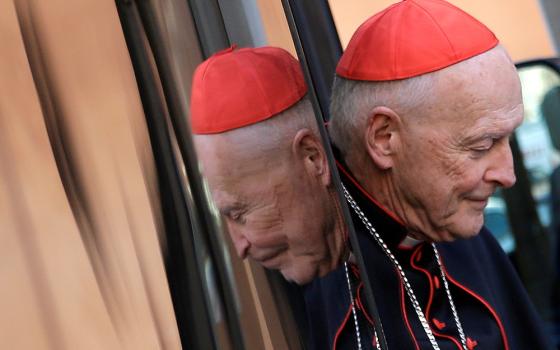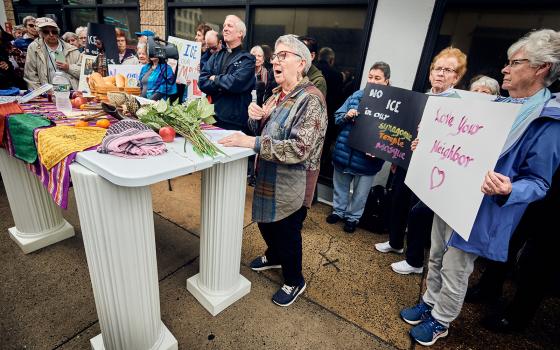
MILOT, Haiti -- When the earthquake shook Port-au-Prince, the three Sisters of St. Joseph of Peace began to prepare the 73-bed Sacred Heart Hospital in the northern city of Milot.
The influx of critically injured patients has been more than they ever imagined, however. The hospital has opened additional wards in a nearby school and nutrition center and converted a local soccer field into a heliport to receive critically wounded patients, who were unable to get adequate treatment for injuries such as broken bones, burns and infections in the Haitian capital.
By the end of January, the patient count had topped 300, and Irish Sister Ann Crawley said that number was expected to grow.
"All of this has happened so quickly," Sister Ann said after putting in a 14-hour day at the hospital.
The demand on Sacred Heart Hospital staff highlights the medical emergency in Haiti. Many hospitals in Port-au-Prince were damaged or destroyed, and many doctors and nurses were killed in the magnitude 7 earthquake Jan. 12.
Sacred Heart Hospital was founded as a 16-bed facility by the Montreal province of the Brothers of the Sacred Heart in 1968 and is now operated by the Center for the Rural Development of Milot -- which receives funding from the Order of Malta. It has grown to become the leading medical facility in northern Haiti.
The facility is so well regarded that it receives overflow patients from the medical ship, USNS Comfort, said Dr. David Butler, director of the earthquake response at Sacred Heart and vice president of the board of directors of the U.S.-based foundation for the Milot rural development center.
"Anyone here is very lucky to be treated here," said Butler, an obstetrician and gynecologist at Holy Name Hospital in Teaneck, N.J.
"Many of the people here would (otherwise) be in field hospitals" or other less-than-ideal situations, he added. "We've had people brought here that were in a Port-au-Prince sewer plant."
Challenges persist at the hospital, which is staffed by both Haitian and foreign medical personnel and served by visiting chaplaincy teams.
Butler said some conditions have worsened due to a lack of specialized equipment or inadequate prior treatment. One patient, for example, developed serious complications from a tetanus infection. Another young patient ultimately succumbed to diabetic acidosis because the Milot hospital lacked a ventilator to help him breathe.
But the foreign medical personnel in Milot -- many of whom are sleeping on the kitchen floor of the convent -- speak of heartening moments, too, and express an admiration for the courage and pleasant demeanor of their Haitian patients.
"They're incredibly stoic," said Dr. Scott Early, a family physician from Lawrence, Mass. "They don't complain when we don't come quickly enough."
Milot residents have shared scant resources to provide patients and their families with meals, while others regularly stop by the hospital to visit and provide motherly attention to newly orphaned children.
The local Baptist preacher, the Rev. Jean Claude Blaise, distributed small radios with the dial locked on an evangelical station.
"I hope that after this (earthquake) the number of evangelicals will grow," he said. "People that survive will see that it was God that saved their lives."
Patients visited by a Catholic News Service reporter generally spoke well of their treatment at Sacred Heart Hospital and warm welcome in Milot.
Mackenson Berger, 19, came to Milot with his mother, who suffered a crushed arm.
"People here have given us food, given us clothing, given us a place to sleep, given us health care," he said.
Another patient, computer science professor Wildor Victor, lost his arm in the earthquake after his workplace collapsed, but he is expected to survive.
"Thanks to Milot, I have another chance at life," he said.
Others were appreciative, but less enthusiastic about being so far from home and the dim prospects of returning to Port-au-Prince.
"There isn't any way to go back ... but I want to go back," said Celine Bien-Aime, a restaurant worker whose arm was crushed by a collapsed wall.
Such anxiousness to leave is rare, said Sister Ann. She explained that discharging patients has become a challenge for the hospital, since most patients have no place to go -- and their reticence to leave keeps badly needed beds occupied.
She said a long-term challenge will be the recovery demands of those suffering complex injuries and the large number of amputees requiring physical therapy.
"It's difficult living in Haiti as a healthy person, and even more difficult without limbs," said Sister Ann. "This medical emergency will last for years."
Butler, an 18-year veteran of medical missions to Sacred Heart Hospital, agreed.
"We're a long way from ending," he said.




